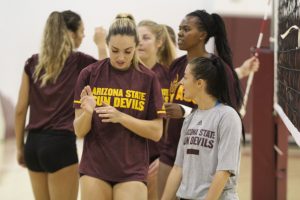- Slug: ASU volleyball, 853 words
- Photo available
By ERIC NEWMAN
Cronkite News
TEMPE — Arizona State has seen an overhaul of its volleyball program recently, and players and coaches say the culture is the best it has been in years.
Following a 12-20 season, which saw a streak of six straight conference losses near the end of the schedule and headaches for the staff and players, the Sun Devils had an end-of-season meeting, in which everybody involved noted that there had to be significant changes.
“I think we focused a lot on team culture this spring and building kind of a family feel. We’re a lot closer this year,” sophomore Courtney Leffel said.
Coach Sanja Tomasevic was promoted from an assistant position to the head job in December, following the release of Stevie Mussie after just one season for reasons ASU never made public. Tomasevic said that her first assignment to the team was for the players to decide what they wanted the new values of the team to be.
She said that with the best teams she has been a part of the culture was built from within, while the coaches were there to facilitate and hold the players accountable. However, she admitted that letting the players hold the reins can harbor inconsistent results.
“You’re just hoping that they come back with something great, but also they’re kids,” Tomasevic said.
The players met late night in the preseason, and came up with the acronym FIGHT following a brainstorm and team dinner.
“F is family, I is integrity, G is gratitude, H is humility and T is team culture,” senior Oluoma Okaro said.
Tomasevic, laying in bed at home after assigning the task, was overcome with emotion after receiving a text from the team in which the players had written out each “pillar” and a paragraph describing exactly what each one meant.
She said her boyfriend, seeing her cry looking at her phone, asked what was wrong, and that all she could say is how smart and thoughtful the players were, and that her assignment actually meant something to them.
“That’s what made me super proud, because I knew they couldn’t just scribble that in 15 minutes. They really took time to write it,” she said.
The players have established trust with one another to an extent that was unseen in previous years, resulting in a 4-0 start with three straight 3-0 wins. ASU takes a 7-2 record into this weekend’s Maverick Classic at Texas Arlington.
Assistant coach Macey Gardner, who joined the staff in May after a Sun Devils volleyball career in which she recorded the ASU record for kills, said that, even with an influx of coaches and players, the act of rebuilding a program together has given the players an opportunity to create something special for the future.
Unlike her tenure with the team, in which there was far more consistency, it is up to the current regime to create a tradition.
“I think just the biggest thing is setting a foundation,” she said. “I came in with something already in place, and something that just needed to be maintained. And these girls are having to create it on their own.”
The trust garnered in creating something new together translates to the court as well, with the players able to focus on playing to the best of their abilities, rather than having to work
“In volleyball, say you’re playing back row. You want to trust that your hitters are going to put the ball away,” Okaro said. “You trust them, you have confidence in them. You don’t even worry about it.”
As happy as the team is with its recent run of success, it has not been easy. Following the team’s first four wins, ASU lost two in a row to Gonzaga and Portland State, committing unforced errors and feeling discouraged because of it. Gardner said the team has implemented a 19-6 rule, meaning the team should win 19 points before it commits six errors, but that the Sun Devils found themselves straying from their system in pressure situations.
However, the way the team has reacted in practice after losing twice speaks how it has succeeded in changing its mindset. Gardner said that past players, facing adversity, could initially react defensively, blaming others for failure.
In preparation for future tournaments, and eventually the Pac-12 season, the team, rather than feeling disappointed, looked at the losses as an opportunity for the players to reflect and find the motivation to keep improving.
“I think these losses were great, as much as it sucks,” Okaro said, “just because it kind of humbles us a little bit.”
The Pac-12 is one of the more competitive conferences in NCAA volleyball each year, including 2016 champion Stanford. ASU’s culture could be tested early and often in conference play. However, if Tomasevic has it her way, the team has set itself up for future success.
“We talk a lot more about process than we do about results. We discuss things that we can control, and things that we do on our side of the net,” she said. “We can’t talk about the results before we talk about the process.”
